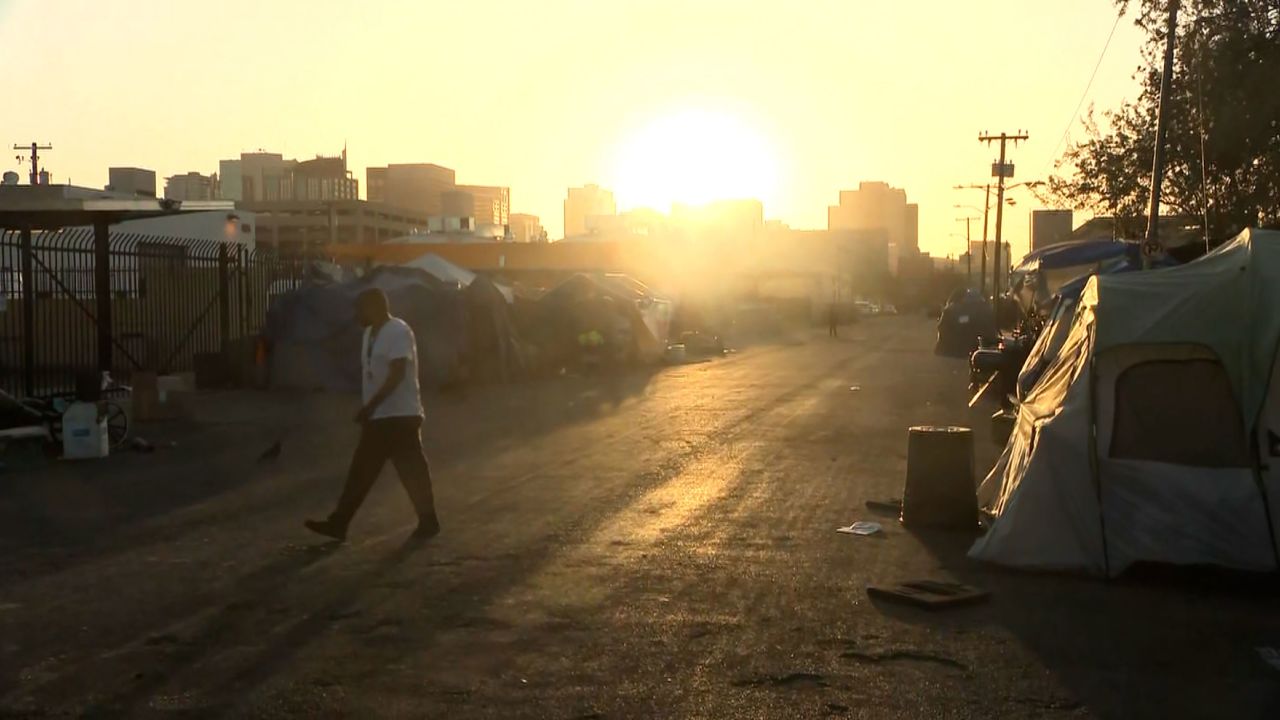Phoenix, Arizona (Trends Wide) — The young widow watched as helpers roamed “the Zone” camp at dawn, offering what they could: water, a bus ticket, or a bed in a hostel, if one was available.
Standing by his tent, Rayann Denny took in the sprawling camp of about 900 people set up along the sidewalks of downtown Phoenix:
“It is another world”.
The soft-spoken 37-year-old woman was left homeless last year after the death of her husband and the inability to pay the bills on her own. This camp, she says, can be “very dramatic,” with outbreaks of violence. But Denny doesn’t stay in a shelter, with his rules and his curfew, as he turns to drugs to get through his days.
“I’m just trying to stay high,” she says, “so I don’t have to deal with the pain.”
However, your home here, precarious as it may be, will soon be gone.

Rayann Denny lives in a tent at a homeless encampment in Phoenix. Credit: Trends Wide
In the latest chapter of America’s increasingly polarized approach to homelessness, Phoenix must permanently vacate the area known as “the Zone” after a judge ruled in favor of neighbors who sued the city, calling the encampment — next to a nonprofit social services center and a few blocks from the state Capitol and the city’s Major League Baseball stadium — an illegal “disruption of the peace.”
According to a lawyer for the plaintiffs, the lawsuit could serve as a model for forcing other US cities to vacate similar encampments. But this possibility worries homelessness advocates, who say it simply takes a critical problem out of the public eye, especially at a time when rising home prices and expensive loans have led to homes on the edge of the abyss.
As Phoenix authorities prepare to begin moving tents out of “the Zone” this week, they are also scrambling to create safe options for the displaced: renting out more hotel rooms and vacant buildings to convert into shelters, and build an outdoor camping area with security, toilets and sinks, the director of the city’s Office of Homeless Solutions told Trends Wide.
But they won’t be available right away.
So for now, the team of helpers has stepped up their years-long effort to try to get residents off the streets.
“We have to move fast,” team leader Nette Reed said. “We have to come up with a plan.”
They sued the city and won
Debbie and Joe Faillace have owned the Old Station Sub Shop – located next to where the camp started – for over 30 years. They often discover property damage, drug paraphernalia and feces when they arrive at work, they said.
“There’s total lawlessness, and it’s getting worse and worse,” says Debbie Faillace. “We want to take our neighborhood back. We want to feel safe.”
As more states pass controversial laws to ban public camping, Arizona Democratic Gov. Katie Hobbs vetoed one such bill this year, saying it only served to make homelessness “less visible.”

Debbie and Joe Faillace are the owners of the Old Station Sub Shop, near where a homeless camp has been set up. Credit: Trends Wide
The Faillaces and others had already sued in state court last year over “the Zone,” an unofficial nickname that is not universally accepted. They alleged the city had allowed its public spaces to violate its own disorderly conduct laws, with unsanitary conditions, drug use, violence and property crime, fire hazards and rights-of-way blocked, court documents show.
In March, a judge ruled in their favor, giving the city a few months to remove the public nuisance, records show.
According to Ilan Wurman, a lawyer for the Phoenix plaintiffs and an associate professor of law at Arizona State University, this legal strategy can serve as a model for anyone who lives or works near large homeless encampments.
“Basically, we’ve shown a proof of concept to use the courts and force cities to do something about the humanitarian aspect of this crisis,” Wurman said. “We hope other businesses, landlords and homeowners will take up this fight in other jurisdictions where there are mass homeless encampments.”
But using such a lawsuit to evict a camp like “the Zone” is an overly simplistic tactic that not only fails to end homelessness, but also increases “invisible homelessness,” the Alliance CEO said. National to End Homelessness, Ann Oliva.
“Of course we are concerned that other communities will adopt this tactic,” he said. “I hope it’s not a model for how other communities want to address this issue, because we know that the only way to really address this issue and homelessness is affordable housing and the services that people want and need to get housing.” .
“I don’t want to… wander the streets”
The Phoenix encampment has about half as many shelter beds as homeless people, a population that has grown 46% since 2019 amid the affordable housing crisis and the COVID-19 pandemic, according to coordinated annual counts. by the Maricopa Association of Governments.
Many of those who live in “the Zone” have jobs or receive government assistance, but say they still can’t pay the rent. By camping outside the non-profit Human Services Campus, they ensured quick access to a secure facility with some 900 shelter beds, which is full most nights, as well as aid such as food, water and health care. , all essential during the scorching Arizona summers.
As the camp clears, “the farther people go…the more difficult it will be for them to access services,” said Amy Schwabenlender, CEO of the Human Services Campus.

A person walks through a homeless encampment on April 18 in Phoenix. Credit: Trends Wide
“People are going to be more likely to die,” he said, “or to get sick and go to the emergency room.” More than 700 homeless people died last year in Maricopa County, in Phoenix, an increase of 23%, compared to 2020, reflecting the increase in homelessness in that period, county officials confirmed to Trends Wide.
According to Rachel Milne, director of the Phoenix Office of Homeless Solutions, the eviction of the area, which will begin Wednesday, will be gradual and in line with the city’s efforts to find alternatives for its residents.
“The city’s approach will be to go one step at a time, block by block, group of people at a time, making sure that we’re able to offer those 50 or more people on that block a variety of different solutions, a variety of different places. to go to, all of whom have the services they need to keep them safe and healthy,” he said. “It’s certainly safer than where they are now.”
But with no confirmed opening date for the city-structured encampment, homelessness advocates expect encampments like “the Zone” to pop up in other Phoenix neighborhoods, they said.
“It moves people to other spaces where they most likely won’t be welcomed either,” Schwabenlender said. “And if you think a safe outdoor space is going to end homelessness, it’s not. All it does is move people from one place to another.”
In fact, the efforts underway in Phoenix are seen by many as a band-aid for the general crisis facing cities across the country. “We have to work on other solutions: to prevent more influx, to prevent people from becoming homeless, to help them get out of the system quickly so that the foster beds we have can be used more effectively,” Milne said.
“I think we have a lot of work to do.”

Stefanie Powell, right, lives in a tent at a homeless encampment in Phoenix. Credit: Trends Wide
Stefanie Powell doesn’t know where she will go when the eviction begins at the camp, where she lives in a tent with her boyfriend, she said.
“I don’t want to end up having to wander the streets again,” Powell said of finding a new place to stay. She is unable to work, she added, due to medical problems such as neuropathy and fibromyalgia.
“It’s hard because nobody wants to see the problem. Nobody wants to acknowledge the problem,” he said.
“They just want it to go away.”





